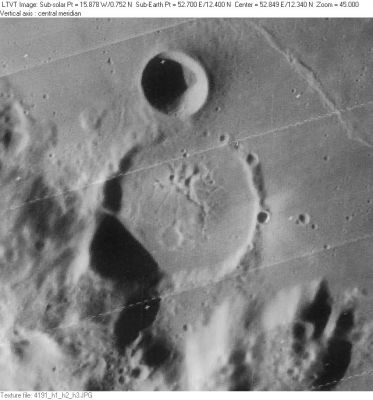Lick
Contents
Lick (near the southwestern rim of Mare Crisium)
| Lat: 12.4°N, Long: 52.7°E, Diam: 31 km, Depth: 0.3 km, Rükl: 37 |
LO-IV-191H Lick is the large ghostly ring with bowl-shaped crater Greaves north of it. Ruined 23-km Lick A is partially visible just below Lick. The wrinkle-ridge in the upper right is not part of any named system.
Images
LPOD Photo Gallery images Lunar Orbiter Images Apollo Images
AS17-145-22257 is a close-up of Apollo 17's CSM America and its exposed SIM-bay (Scientific Instruments Module). Near the lower margin of this photograph, behind the "23", is Lick and the bright ray-craterlet on the eastern part of its rim. The southwestern part of Mare Crisium is seen in the lower left corner. Parts of Mare Fecunditatis and Sinus Successus are seen at the curved lunar horizon (right of CSM America). The obstruction at the right margin of the photograph is part of LM Challenger. - DannyCaes Dec 16, 2007
Maps
(LAC zone 62A1) LAC map Geologic map LM map LTO map
Description
Description: Wikipedia
Additional Information
Depth data from Kurt Fisher database
- Pike, 1976: 0.3 km
- Westfall, 2000: 0.3 km
- The peak to the southwest of Lick casts a shadow indicating a height of 3540 m; Pike and Westfall are evidently not including this in their depth estimates. - Jim Mosher
- Lick D is a thermal anomaly crater, implying a youthful age - Moore et al, 1980
- Lick has an elevated center that is cut by rilles - it is a floor-fractured crater, whose low moat has been flooded with mare lava. - tychocrater Oct 20, 2007
Nomenclature
- James Lick (August 25, 1796 – October 1, 1876) was an American carpenter, piano builder, land baron, and patron of the sciences. At the time of his death, he was the wealthiest man in California, and left the majority of his estate to social and scientific causes. In 1888, Lick Observatory was completed and given to the University of California as the Lick Astronomical Department. The Observatory was the first permanently staffed mountain top observatory in the world and housed the largest refracting telescope in the world at that time.
- Lick F is unofficially called James on Lunar Topographic Ortophotomaps 61-B3 and 62-A4. Who was James? See this Wikipedia-page.
- Here's a curiosity: the LTO's James (Lick F), is located very near the IAU's JAMES Lick.
- James (Lick F) is one of the few LTO-related "new" crater-names on the moon's Near Side. Most of these names appear at the moon's eastern limb (near Mare Smythii) and at the Far Side. - DannyCaes Mar 29, 2008
LPOD Articles
Bibliography
